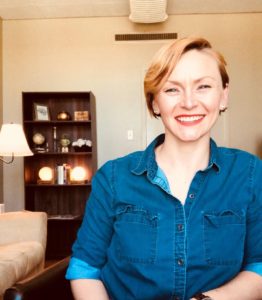Thank goodness patience is something that I can work on. Not something that some people are blessed with and others don’t have. The challenges that come with being a small business owner and “starting up” are varied, frustrating, and often incredibly surprising. We can get exactly the right advice, feedback, or support we need, but we still have to go through the emotions and the stressors ourselves. This can often feel lonely, or our stress responses to those tough times give us the “error message,” that we must have made a mistake in what we’re doing, or that it will be this hard forever. This is defined by neurobiologists as “distress intolerance.”
As humans, we are creatures of habit, and it takes a whole lot of patience and tenacity to make sweeping changes in life. But the more we gently challenge ourselves to do things that are tough but ultimately beneficial for us, we are building “distress tolerance.” Distress tolerance is exactly what it sounds like; the ability to tolerate distress! I think this is so inspiring because whenever I feel frustrated, self-doubting, or impulsive in a tough situation, my patience practice helps me to remember that I am training my mind and body to deal with challenges, and this is making me mentally strong.
Patience is a Skill
I recently paid my taxes for the first time as a full-time small business owner. I thought I knew what to expect, and I planned as well as I could. Suffice it to say, I learned a whole lot of new vocabulary terms. I also left with a fat checklist of what to do, and what NOT to do next year. When I interviewed my CPA before I started working with him, I asked him, “can you be gentle with me? I’m sure I’ve made a few mistakes and I’m probably going to be sensitive about it.” He thought that was pretty funny since he works primarily for small business owners.
Of course, I would have made mistakes, he laughed, I had never done this before! Patience for ourselves and our own process as we learn and grow as business owners in private practice also means being accepting of our personal areas of growth and recognizing how they can be barriers to patience and confidence practices. For example, being highly sensitive generally makes us great therapists, but it may not be an asset when we need to hear about the mistakes we’ve made, or we find out that we owe the IRS more than we thought.
Patience and Learning
In summation, if I want to learn how to play Bach on the guitar, I’ll have to practice. If I want to be more patient, I have to practice. If we want to grow our business, make more money, or start a group practice, we need the skills of patience and tenacity to make these things happen. Thankfully we have the mental capacity to build these skills and to even have a sense of humor along the way. Best of luck to you this year for your growth practices and for your business!
 Elizabeth Pace is a therapist and clinical supervisor in private practice in New Orleans, Louisiana. What she loves the most about private practice is supporting others as they question their old ideas about “doing it right” and start to cultivate a newer awareness about the kind of life they want to fearlessly pursue. Another passion is advocating for and advancing the counseling field through presentations on professional development, financial literacy, and coaching others towards the personal and professional goals that bring them joy, excitement, and financial stability!
Elizabeth Pace is a therapist and clinical supervisor in private practice in New Orleans, Louisiana. What she loves the most about private practice is supporting others as they question their old ideas about “doing it right” and start to cultivate a newer awareness about the kind of life they want to fearlessly pursue. Another passion is advocating for and advancing the counseling field through presentations on professional development, financial literacy, and coaching others towards the personal and professional goals that bring them joy, excitement, and financial stability!
You can visit Elizabeth’s website here!

